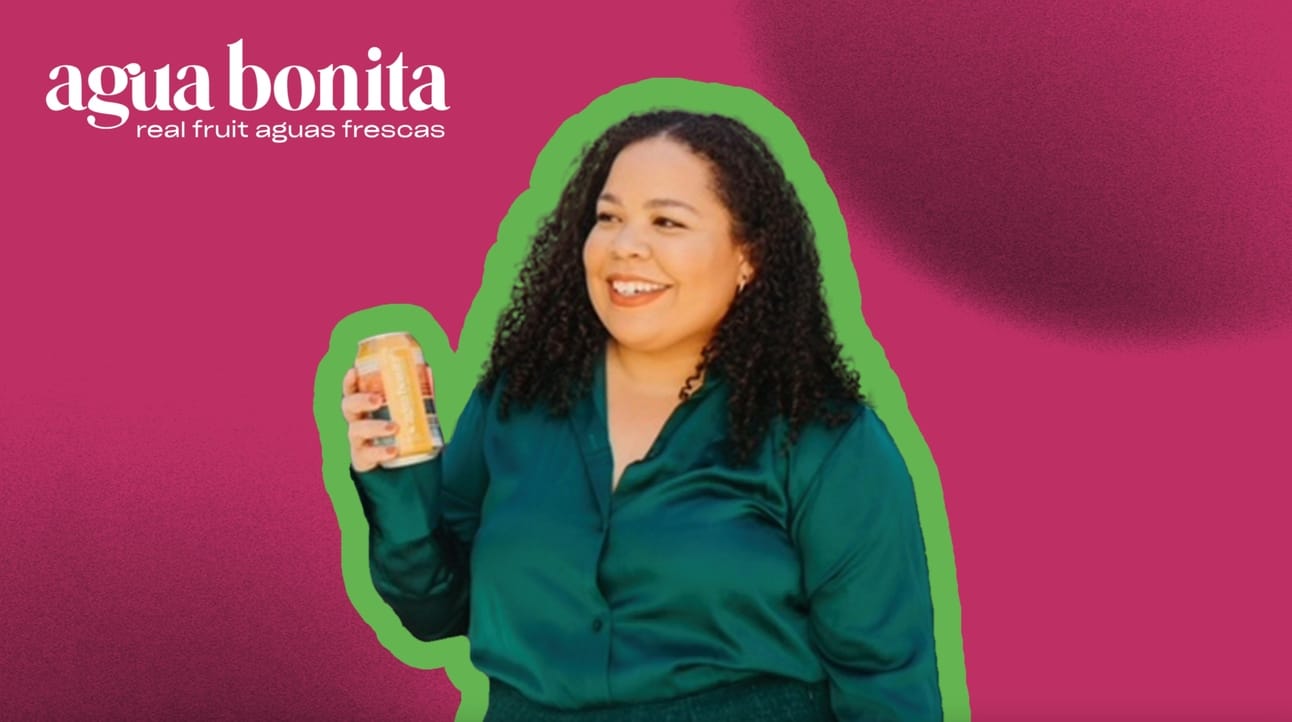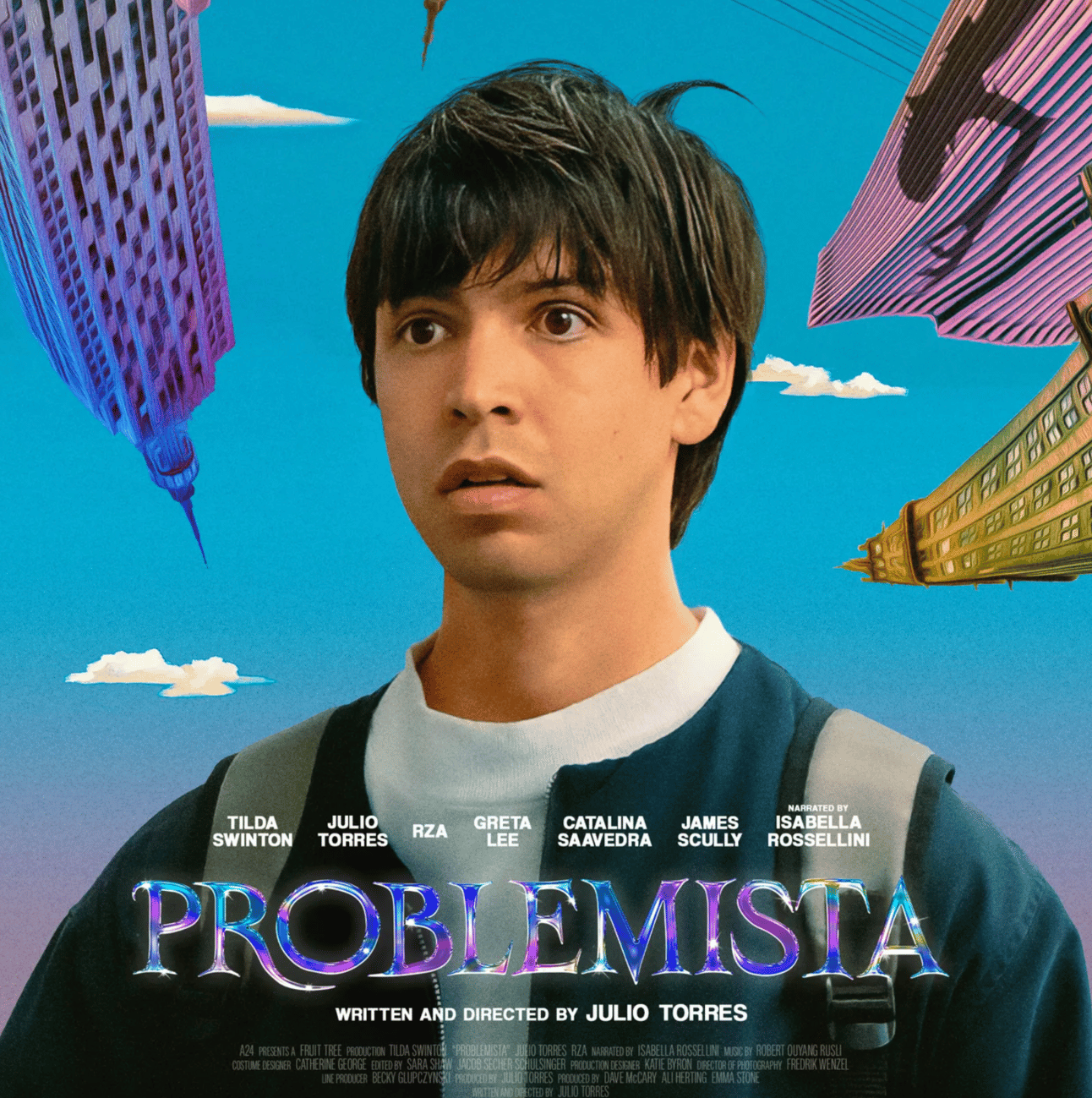INTRODUCTION
Saludos! After a weeklong break, we’re back! In this week’s newsletter, we explore Kayla Castañeda's entrepreneurial journey with Agua Bonita, share Julio Torres' unique perspective on immigration in "Problemista," and cover the Latino migrant worker experience in Immokalee, FL.
So, grab your afternoon cafecito and dive in. ☕️
BUSINESS
Agua Bonita: How Kayla Castañeda is Redefining Drinks with Tradition and Innovation

In the midst of a global pandemic that left many reevaluating their paths, Kayla Castañeda found her calling in a refreshing childhood memory – aguas frescas. With her consultancy work slowing down, a homemade batch of this traditional Mexican beverage, made by her mother-in-law, rekindled her entrepreneurial spirit.
Aguas frescas, a vibrant blend of fruit, water, and sweetener, are not just a drink but a cultural staple that Kayla grew up with, thanks to her Grandpa Ismael's refusal to let ripe, field-picked fruit go to waste. This ethos of minimizing waste while cherishing what's valuable deeply influenced the foundation of Agua Bonita, a company determined to offer a ready-to-drink version of aguas frescas, harnessing produce that doesn't meet the superficial standards of grocery stores.

Courtesy of Agua Bonita | Facebook
Agua Bonita stands out as the first Latina-owned beverage brand in the U.S. to achieve such widespread distribution and to raise over $1 million in funding. The brand modernizes the traditional aguas frescas by significantly reducing the sugar content, embodying the mantra "our culture, our way." This approach not only pays homage to a rich cultural heritage but also adapts it to contemporary health-conscious consumers.

Courtesy of Kayla Castañeda | LinkedIn
Kayla's journey and Agua Bonita's success captured the attention of Forbes, landing her on the 2022 Forbes 30 Under 30 list. Forbes celebrated her for redefining consumption, acknowledging her innovative bridge between tradition and modern dietary preferences.
Looking ahead, Kayla envisions leading Agua Bonita into a future where the brand remains culturally authentic while championing sustainability and community support. The company's commitment extends beyond offering a healthier beverage alternative; it also involves supporting migrant farmworkers through partnerships with nonprofits, reflecting Kayla's deep-rooted belief in the power of business to be a force for good.
Her personal milestones, such as becoming a mother, are shared with transparency and pride, reinforcing her role as a "badass jefa" who embodies strength, leadership, and vulnerability. Kayla's success with Agua Bonita is a testament to the power of ambition, cultural pride, and the relentless pursuit of a vision that benefits both people and planet.
CULTURA
Julio Torres & 'Problemista': Weaving Comedy with Commentary on the Immigrant Experience

Problemista Movie Poster
Julio Torres, a Salvadoran comedian known for his unique blend of surreal humor and insightful storytelling, has made a significant mark with his film "Problemista." Through a narrative that intertwines the absurd with the painfully real, Torres offers a glimpse into the immigrant experience, spotlighted against the backdrop of the New York art scene and the labyrinth of U.S. immigration policies.
Torres embarked on his American dream about a dozen years ago, facing the daunting U.S. immigration system head-on. His journey was filled with odd jobs, from serving as a translator at parent-teacher conferences to interviewing for a position as a magician’s assistant, only to find out the job was for a saxophonist with an unusual performance gimmick. These experiences, rich in both humility and the absurd, provided fertile ground for Torres' comedic and narrative creativity.

Johannes Eisele | AFP VIA GETTY IMAGES
Despite the challenges, Torres’ ambition never waned. He pursued his creative passions, leading him to the New School in New York, where he studied English literature. It was here that his comedic talent began to flourish, catalyzed by friendships and collaborations with fellow creatives like Spike Einbinder. His post-college years were a blend of perseverance and creative exploration, eventually landing him a writer's role on "Saturday Night Live" and co-creating the HBO cult favorite "Los Espookys."
"Problemista" is a semi-autobiographical reflection of Torres’ early struggles in the U.S., cleverly repackaged into a surreal comedy. The film tells the story of Alejandro, a Salvadoran immigrant whose toy design dreams are stymied by his undocumented status and a series of demeaning jobs, mirroring Torres’ own experiences. This narrative is not just a vehicle for Torres’ humor but also serves as a commentary on the immigrant experience, emphasizing the human stories behind the bureaucratic process.
In the film, Torres navigates the complexities of the art world and immigration through the eyes of Alejandro, who, much like Torres, finds solace and expression in creativity. This journey is peppered with eccentric characters, such as Elizabeth (played by Tilda Swinton), a capricious art critic who embodies the unpredictable nature of both the art world and life itself.
Torres' approach to "Problemista" and his other works is deeply influenced by his background and family. His mother, an architect and fashion designer, played a crucial role in nurturing his creative talents, even contributing to the design of a playground featured in "Problemista." This connection underscores the film's themes of creativity and perseverance, reflecting Torres' journey from a young dreamer in El Salvador to a celebrated comedian and filmmaker in the U.S.
Beyond "Problemista," Torres continues to push boundaries, leveraging his experiences and unique voice to explore themes of identity, creativity, and the immigrant experience. His work, including the critically acclaimed HBO special "My Favorite Shapes," showcases his ability to find humor and depth in the mundane and the fantastical alike.
As "Problemista" makes its mark, Torres looks ahead, contemplating future projects that blend his diverse interests and talents. Through his work, Julio Torres invites audiences to laugh, reflect, and perhaps see the world a little differently.
IMPACTO
Harvesting Resilience: Insights from Immokalee's Migrant Farm Worker Experience

Spencer Platt | GETTY IMAGES
Outside of Minority Majority, in my full-time job, as the Assistant Director of the McKeen Center at Bowdoin College, part of my role involves leading our Alternative Spring Break (ASB) programs. Our ASB trips are an initiative that embodies our commitment to educating students on social change through direct service and experiential learning.
Throughout a semester, students delve into social issues via a series of seminars, choosing to spend their spring break gaining direct experience in these areas over traditional leisure pursuits.
This year, I coordinated three student-led trips to New York, Chicago, and Immokalee, Florida. I was particularly involved with and attended as the Staff Traveler for the Immokalee trip, titled “Cultivating Migrant Communities.”.

Tomatoes harvested by students in a community garden to be
distributed in a local food pantry. | Danny Miró
Given that Immokalee is a rural town, where 75.53% of the population identifies as Hispanic or Latino–I wanted to take this time to quickly share information about the trip and bring awareness this community. The region is a significant agricultural center, supplying 90% of the U.S.'s tomatoes among other crops.
Our visit aimed to provide a deep dive into the lives of migrant communities there, focusing on how they navigate and establish their sense of belonging through education, food security, healthcare, and labor rights.
A highlight was joining the Farmworker Freedom Festival by the Coalition of Immokalee Workers in Palm Beach, spotlighting the human rights struggles and wage issues of migrant farmworkers. This festival, alongside a peaceful protest at the home of Wendy's CEO, emphasized the need for fair labor practices, with Wendy's being noted for not committing to fair wages for tomato farmworkers, unlike others such as McDonald's and Whole Foods.

Students volunteering at a community garden in Immokalee, FL | Danny Miró
Beyond advocacy, our engagement in Immokalee included volunteering at the Guadalupe Center for early childhood education and aiding in community gardens, crucial for providing healthy food and fostering community spirit.

Library at The Guadalupe Center | Danny Miró
We also interacted with healthcare organizations striving to offer services in an area devoid of hospitals, highlighting the dire need for accessible healthcare.
The disparity between Immokalee and the wealthy Naples, both in Collier County, starkly illustrates the economic inequality impacting Immokalee's predominantly Latino community. This contrast is exacerbated by Immokalee's status as a food desert, despite its pivotal role in agriculture, underscoring the community's struggle for access to fresh, affordable food.

Farmworker Freedom Festival 2024 | Danny Miró
Reflecting on our trip, it's clear that there's much work to be done to support the migrant farmworkers, many of whom are Latino, who play a crucial role in our agriculture industry and in bringing food to our tables.
Learn more about the incredible work being done by the Coaliton of Immokalee Workers here: CIW About Us
EN LA COCINA
How to Make: Sopa Paraguaya

David Malosh for The New York Times
Sopa Paraguaya, often described as Paraguay's national dish, is a unique and hearty cheese and onion cornbread. Despite its name suggesting it's a soup, it's actually a savory cake that pairs wonderfully with any meal. Here's how to make it:
Ingredients:
1 cup corn oil
1 large yellow onion, finely diced
1½ teaspoons fine sea salt
1 cup corn kernels (can use canned or fresh)
8 large eggs, whites and yolks separated
4 cups (566 grams) precooked yellow cornmeal (preferably P.A.N.)
4 cups whole milk
2¼ cups (8 ounces) grated Muenster or mozzarella cheese
Instructions:
Preparation: Preheat your oven to 375°F and grease a 9-by-13-inch baking pan with a bit of corn oil.
Cook the Onions: Sauté the onion in corn oil over medium heat until translucent (about 10-15 minutes), then season with salt and let it cool.
Purée Corn Kernels: Blend the corn kernels into a coarse purée and set aside.
Whip the Eggs: Beat the egg whites until frothy and light, then incorporate the yolks one at a time.
Mix Ingredients: In a large bowl, combine the cornmeal and puréed corn. Mix in the cooked onions and oil, then gradually add half the milk. Fold in the cheese and half of the egg mixture, combining thoroughly. Add the remaining eggs and milk, mixing to a wet, cake batter-like consistency.
Bake: Pour the mixture into the prepared baking pan and bake for 40-45 minutes until golden brown. A toothpick should come out clean from the center.
Cool and Serve: Allow the Sopa Paraguaya to cool for 15-20 minutes before serving. It's best enjoyed warm but can be stored in the refrigerator for up to 4 days or frozen for a month.
NUESTRO TRIVIA: Last Week’s Answer
Last week, we asked: Who was the first Latina to be featured in a Rock and Roll Hall of Fame Exhibit?
The correct answer is: Rosie Hamlin

Rosie Hamlin, best known for her soulful rendition of the 1960 hit "Angel Baby" with her group Rosie and the Originals, holds a special place in music history as one of the first Latinas to be honored by the Rock and Roll Hall of Fame.
Hamlin, of Mexican descent, showcased her remarkable talent early on; "Angel Baby" soared to the Top 40 in 1961 when she was just 15 years old.
As the lead singer and songwriter, her distinctive voice and heartfelt lyrics resonated with listeners globally, leaving a lasting impact on the rock and roll genre.

Her success with "Angel Baby" not only secured her a place in music history but also paved the way for future generations of Latina artists in a field where they were notably underrepresented.
NUESTRO TRIVIA: This Week!
Question: What is the name of the traditional Paraguayan lacework that is recognized for its intricate designs and is a significant aspect of the country's cultural heritage?
Reply with your guess! Answers will be revealed in the next newsletter!
RIEGA LA VOZ
Enjoyed today’s newsletter? Please share it with family or friends, using the link below.
https://minoritymajority.carrd.co/
